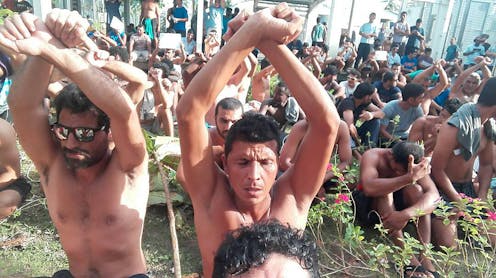UN slams Australia’s human rights record
- Written by Anna Cody, Associate Professor and Director, Kingsford Legal Centre, UNSW

Last night, the United Nations Human Rights Committee released its recommendations from its review of Australia’s compliance with a key human rights treaty, the International Covenant on Civil and Political Rights.
The committee harshly criticised Australia for failures in key areas. These included the treatment of refugees, Indigenous rights and inadequate protection of human rights, including the lack of a national human rights act.
What is the UN Human Rights Committee?
This is the treaty body for the International Covenant on Civil and Political Rights. The committee is made up of 18 independent human rights experts. Its key functions are to:
What did the committee say about Australia’s human rights record?
The committee noted areas in which Australia’s record had improved. These included the establishment of the Parliamentary Joint Committee on Human Rights and the introduction of protections against discrimination on the grounds of sexual orientation, gender identity and intersex status.
Read more: With a seat on the UN Human Rights Council, Australia must fix its record on Indigenous rights
The committee also commended Australia for its commitment to ratifying the Optional Protocol on the Convention against Torture.
However, concerns far outweighed improvements in human rights.
The rights of refugees
The committee widely criticised Australia’s refugee policy for breaching Australia’s human rights obligations under the convention.
It raised concerns about refoulement (the forcible return of refugees to their home countries), mandatory detention, Operation Sovereign Borders and offshore detention. This includes the recent closure of the Manus Island Regional Processing Centre.
The committee urged Australia to end offshore processing and bring the men on Manus to Australia or another safe country. It emphasised the need for detention to be used to assess individual risk, not as a general deterrent. It also found that Australia has “effective control” over the detention centres on Nauru and Manus Island.
The rights of Indigenous people
The committee expressed concern about disproportionately high (27%) Indigenous incarceration rates. It recommended that measures such as mandatory sentencing and imprisonment for not paying fines be repealed.
The committee further recommended that Australia provide adequate funding to the National Congress of Australia’s First Peoples, and consider constitutional change to reflect the special status and fully protect the equal rights of Aboriginal and Torres Strait Islander peoples.
As it has done before, the committee urged Australia to establish a national reparations scheme for members of the Stolen Generation.
The rights of lesbian, gay, bisexual, transgender and intersex people
The committee roundly criticised unnecessary medical interventions on intersex people, particularly intersex infants and children. It recommended that the requirement for Family Court authorisation for second-stage hormone treatment for young people diagnosed with gender dysphoria be removed.
Barriers to gender and sex recognition on documents were also criticised.
The committee took a strong stance on the same-sex marriage postal survey. It stated that:
resort[ing] to public opinion polls to facilitate upholding rights under the Covenant in general, and equality and non-discrimination of minority groups in particular, is not an acceptable decision-making method.
The committee recommended that the Marriage Act be amended, regardless of the outcome of the postal survey.
The rights of women
The committee noted the endemic nature of violence against women, and the disproportionate impact this has on Indigenous women and women with a disability. It recommended that Australia increase its efforts to prevent all forms of violence against women.
Read more: New Home Affairs department should prompt review of Australia’s human rights performance
The committee again raised concerns about the involuntary sterilisation of women and girls with intellectual and cognitive disability, and recommended that Australia abolish this practice.
The human rights framework
As in previous reviews, the committee recommended that Australia introduce a comprehensive national human rights act to give effect to the human rights protections in the covenant.
It also recommended that federal anti-discrimination laws be strengthened to ensure effective protection against all forms of discrimination. It specifically noted the lack of federal protection against discrimination on the basis of religion.
The committee criticised previous attacks by politicians on the Australian Human Rights Commission and recommended that Australia respect the independence of that body.
Where to from here?
The release of these recommendations comes at a crucial time for Australia, which last month won a seat on the UN Human Rights Council.
The council is responsible for strengthening the promotion and protection of human rights, and for addressing human rights violations around the world.
Council members must demonstrate their willingness to improve their domestic human rights situation. To claim legitimacy in human rights on the world stage, Australia needs to demonstrate a genuine commitment to human rights at home.
Under the committee’s follow-up procedure, Australia must explain how it will implement selected recommendations within 12 months. The committee’s selected recommendations focus on Australia’s treatment of refugees.
Australia was criticised at the review for a history of “chronic non-compliance” with committee recommendations. The challenge for Australia will be to engage positively with the recommendations and urgently implement substantive change to promote and protect human rights.
A good starting point would be a national human rights act, to fully incorporate Australia’s international human rights obligations into law. Furthermore, Australia should reconsider its response to the Referendum Council’s recommendation of an Indigenous voice to parliament.
Authors: Anna Cody, Associate Professor and Director, Kingsford Legal Centre, UNSW
Read more http://theconversation.com/un-slams-australias-human-rights-record-87169




